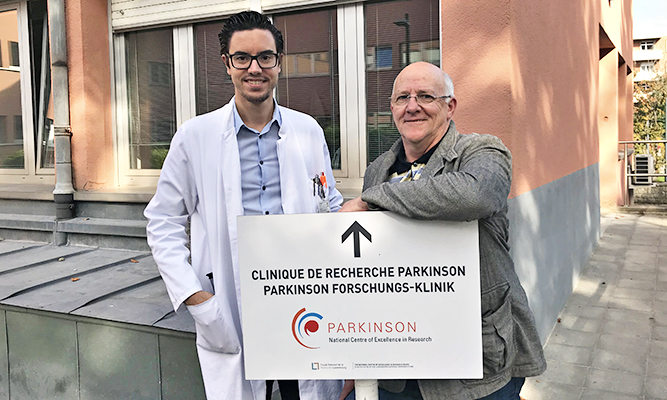Last week, the clinical team of the Luxembourg Parkinson’s Study reached a new milestone. For the first time in Luxembourg, cerebral spinal fluid (CSF), the fluid that surrounds the brain and spinal cord, has been collected for research purposes.
These samples are extremely precious, not only because their collection is a bit more elaborate than of a simple blood or urine sample. More importantly, this liquid has been in direct contact with the brain and hence has the potential to contain additional information about the development of Parkinson’s disease. The researchers aim to collect these samples to look for potential biomarkers to diagnose the disease, similar to what is already established in Alzheimer’s disease.
The first person to undergo this procedure was Armand Lanners, who participated in the Luxembourg Parkinson’s Study as healthy control subject. “A friend of mine, who also participated in the study, told me about it. I thought it is a great way to help people with Parkinson’s and their families who suffer from this disease. And research is so important to develop treatments,” Lanners explains his motivation to participate.
Upon arrival in the Parkinson’s Research Clinic, resident neurologist Dr. Pierre Kolber explained the procedure in detail to Mr. Lanners and informed him about the potential side effects and how to avoid these. For the collection, the participant will sit on the examination bed and his lower back is disinfected to be able to work under sterile conditions. “We then locate the spot where we insert the atraumatic needle. In contrast to the lay perception, the insertion of the needle cannot reach the spinal cord, as the entry site is far distant from it,” explains Dr. Kolber. “Admittedly, the part where the needle goes through the ligaments between the vertebral processes can hurt a bit. The participant can get the feeling of pressure, electric discharge in the back or legs. But this never causes any lasting damage and will disappear within a few hours or days.” As soon as this hollow needle is inserted the precious liquid slowly drips out and the neurologist can collect enough CSF drop by drop within 5-10 minutes.
“But going to the dentist is worse!”
For research CSF samples from both patients as well as healthy control subjects for comparison are extremely important. But what convinces someone who is not affected by the disease to undergo this procedure? “Dr. Kolber took a lot of time to explain me everything in great detail so that I was well prepared and trusted him,” says Mr. Lanners. He reports that to him it wasn’t painful, rather a bit uncomfortable as he felt pressure on his back, as explained before. “But going to the dentist is worse! I would do it again and nobody needs to be afraid of this,” he laughs at the end of the procedure.
After a short resting period, Mr. Lanners is allowed to go home. In case headaches would come up, Dr. Kolber recommends taking a Paracetamol or caffeine tablet. „Or of course drinking a good cup of espresso!“
Afterwards the precious sample was transferred to the Integrated BioBank of Luxembourg for adequate processing and storage to keep it accessible for research for many years. Researchers at the Luxembourg Centre for Systems Biomedicine (LCSB) of the University of Luxembourg will then analyse the molecular content of different patients’ and control’ samples to look for differences in its composition that could indicate if somebody suffers from Parkinson’s disease.
The CSF collection is one of the ways you can donate samples for the research programme Luxembourg Parkinson Study . If you are interested in participating in the study, or if you have already participated in the study and are now interested in donating CSF, please contact the Parkinson's Research Clinic. Both people with and without Parkinson's disease can participate.
- Email: This email address is being protected from spambots. You need JavaScript enabled to view it.
- Tel: 44 11 4848





